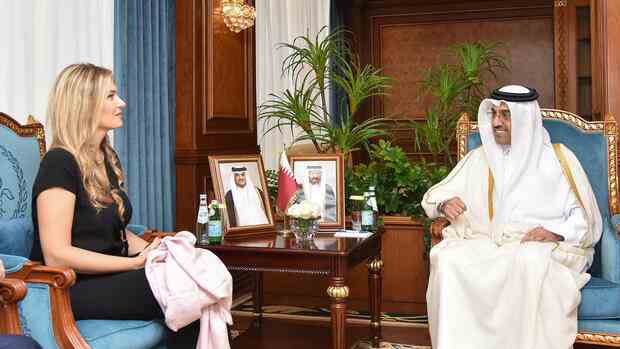The Vice President of the European Parliament is suspected of having received bribes from Qatar.
(Photo: VIA REUTERS)
Brussels The alleged bribery of a vice-president of the European Parliament has shaken Brussels – but Michiel van Hulten, director of the Brussels office of Transparency International, considers this case to be just one of many.
On Friday, Belgian investigators searched several apartments, arrested six people and confiscated several hundred thousand euros in cash. There is a suspicion that these are bribes that were handed over to Greek MP Eva Kaili from Qatar.
Van Hulten was also once an MEP, from 1999 to 2005. He later became leader of the Dutch Labor Party. Since 2019 he has been working for the organization Transparency International, which fights corruption worldwide.
Van Hulten told the Handelsblatt that violations of the rules would not be punished in the European Parliament. This has created a “culture of impunity” that encourages corruption. To fix that, an independent institution with investigative powers is needed.
Top jobs of the day
Find the best jobs now and
be notified by email.
Read the full interview here:
Mr van Hulten, you said over the weekend that the bribery of an MEP was not an isolated case. What do you mean by that?
This case is of a special magnitude. But we have seen a number of scandals in the European Parliament in recent years in which MEPs or staff have been involved in unacceptable operations. There have been instances where MPs have been paid to table amendments. It’s not unusual for MPs to go on trips paid for by third countries like Qatar.
Director of the Brussels office of Transparency International. (Photo: Transparency International)
Do you see a system behind it?
If the European Parliament had a different stance on transparency and integrity, the current scandal would be impossible. Rule violations will not be penalized. There is a culture of impunity that makes corruption possible. All attempts to change something are fought.
What can you do?
The most important measure would be an independent ethics committee. Ursula von der Leyen has announced this, but has not yet submitted a draft law. Delegating investigations and sanctions to an independent body outside the EU institutions is the only way to really ensure enforcement of the rules. In the European Parliament, the President alone is responsible for sanctions, which de facto means that there are no sanctions.
Are there such bodies in other parliaments?
There are different approaches. In the Netherlands there are no lobbying rules at all, but the UK has an independent commission that investigates allegations. But in the European Parliament, where so many different political cultures come together, it is almost impossible to agree on universal standards of behavior.
>> Read here: Corruption scandal in Brussels – Who are the accused and what’s next
Is that the reason for what you call the “culture of impunity”?
In part yes. But at the same time it is an excuse not to have to do more.
At the same time, the European Parliament is considered particularly transparent.
In certain respects, Brussels is often ahead of the Member States. The legislation in the European Parliament is actually very transparent, the lobby groups are very visible. But a country like Qatar can do pretty much anything it wants without being noticed.
Now the alleged bribery of Eva Kaili has been discovered. Doesn’t that show that the systems are working reasonably well?
If only cases involving more than half a million euros in cash are uncovered, then something is wrong with the system. It is very likely that there will be other cases – perhaps with smaller sums, with paid trips or with other favors. The Belgian authorities can’t find anything like that.
Investigations into one of the Vice Presidents of the European Parliament, Eva Kaili, have triggered a discussion about stricter lobbying rules.
(Photo: IMAGO/Future Image)
Do you know of any cases?
We know of former members of parliament who raised such issues and then lost their jobs. There is no protection for whistleblowers within Parliament – although Parliament itself has passed legislation on whistleblower protection. So this is very likely the tip of the iceberg. We also need to make the rest of the iceberg visible.
>> Read here: EU corruption affair: Traffic light coalition at odds over stricter lobbying rules in Germany
Who prevents that there are better rules?
The opponents of such rules are probably mainly in the two large groups, i.e. the Conservatives and the Social Democrats. Some EU member states also have little experience with transparency rules and are skeptical. But it is above all a cultural problem in Parliament: In Parliament you feel as if you are above the law.
What are you up to?
You can see it in the way decisions are made there. A few months ago, several factions agreed on a new general secretary, completely ignoring the rules that exist for filling this post. Far too many Members of Parliament are involved in this type of activity. This creates a culture that also makes corruption possible.
Aren’t backroom deals normal in politics?
Yet. But there is actually a regulated procedure for filling this high office. This was avoided and instead other important posts were divided among themselves in the package with the cast.
More: The corruption allegations undermine the legitimacy of the EU Parliament – to the delight of Viktor Orban
